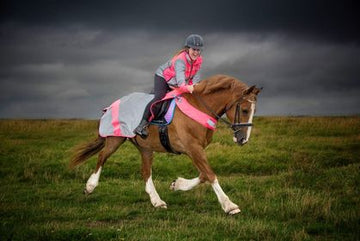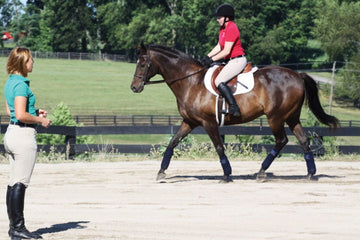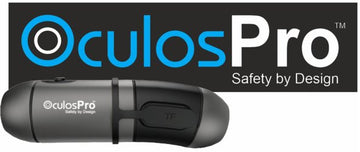For any rider, the choice of where to find knowledgeable, safe and value-for-money help to improve their own riding, the training of their horse or both isn’t always straightforward. Whether you prefer the camaraderie of group lessons, enjoy the experience of a schoolmaster or choose more intense one-on-one training sessions on your own horse, how do you know that your chosen instructor is qualified and competent at what they do, properly insured and that the venue at which the training takes place is both safe and managed in accordance with relevant legal and other requirements?
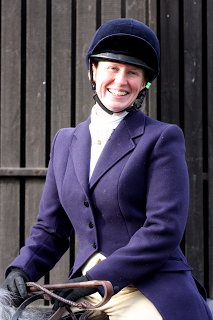 Freelance Instructor Frances Murray BSc Hons, PGCE, BHS Int SM, Int T based near Cambridge confirms; “Accidents do happen and then there can be huge problems with insurance for the clients, instructors and even the venues. In my experience, accidents can result from a broad range of issues, with venues, facilities and sometimes because an instructor’s level of knowledge and teaching style is ‘inappropriate’.
Freelance Instructor Frances Murray BSc Hons, PGCE, BHS Int SM, Int T based near Cambridge confirms; “Accidents do happen and then there can be huge problems with insurance for the clients, instructors and even the venues. In my experience, accidents can result from a broad range of issues, with venues, facilities and sometimes because an instructor’s level of knowledge and teaching style is ‘inappropriate’.
“Some venues are really good and they ‘vet’ visiting instructors, which I think is a good idea, but not all of them do. I can go and hire one particular local venue and know that they wouldn’t care who I was! This attitude is too widespread.
There are two organisations that set standards for riding schools in the UK, the British Horse Society (BHS) and the Association of British Riding Schools (ABRS). A riding school approved by one or both of these organisations ensures that they meet a certain standard. Riding schools are also formally inspected every year, so any approval should be current and require these businesses to have relevant insurance in place, along with a robust health and safety policy. Approved riding schools invariably employ formally qualified instructors of different grades, so you know that these individuals have proved they know how to teach others.
Riding schools offer different types of lessons, from private, where one rider is taught by an instructor, to semi-private where two or three people are taught in the same lesson, or group lessons where larger groups of riders are taught by one instructor at the same time. As you would expect, prices vary, with private being more expensive and group lessons being cheapest.
In the case of freelance instructors, who hire a venue to work with you and your horse, you should always be equally certain that they are genuinely qualified. In addition to the BHS and ABRS, the governing bodies of the main competition disciplines maintain registers of qualified instructors who have specialist expertise in a particular discipline, which are easy to check online.
Frances Murray explains; “These registers of instructors ensure that everyone listed who is working as an instructor, has at least a basic level of competence and insurance, is DBS checked [Disclosure & Barring Service] and has undertaken relevant Safeguarding and First Aid training.
“I think that if you want to support your industry as an instructor, you should make your work official and I don’t accept people who say they can’t afford to take exams and pay annual fees for insurance and inclusion on a register. If you are that good, you will find the qualification very easy and it will bring clients to you. I think of it all as ‘continuing professional development’ (CPD) and I spend a lot of money on CPD of many different sorts.”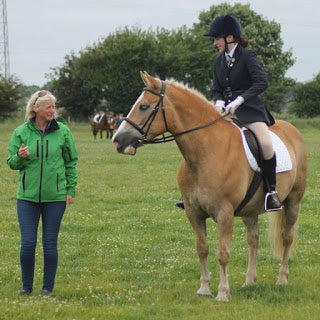
Claire Dryden BHSII shares a similar view. She works across the northern region as a freelance instructor, holds BHS qualifications and is working towards UKCC Level 3 (Generic), in addition to being a YMCA Level 3 Mat Pilates teacher.
She observes; “UKCC level 2 and 3 (specific) coaches without BHS or similar practical exams to compliment their knowledge, potentially lack the holistic ability to assess every aspect of effective training.
“Riders should ask more questions to ensure that their prospective trainer has relevant and solid experience, for example a dressage ‘coach’ is unlikely to have the skills to make a good jumping trainer without prior experience. In the same vein, whilst I covered fitting tack as part of my BHS exams, in no way would I consider myself competent to fit a saddle to a horse; I recommend clients engage a qualified saddle fitter to do that job.
“Everyone should also check that their chosen instructor has valid insurance. In my case, I need separate insurances to teach riding lessons and Pilates and I have spent thousands of pounds to train, take exams to ensure I’m properly qualified and that my CPD is always up to date.”
Frances offers this advice; “Riders looking for an instructor should start with the body to which they feel most closely associated and use an instructor from its register, which may be the BHS, or in the case of the competition bodies, will be a specialist from your discipline. These people are on the register to be monitored, so you can complain – and they can be struck off! That should give riders confidence in their choice.”
Verity Daughtrey from Herefordshire agrees, saying; “I regularly have lessons with a British Eventing Master Coach. He is brilliant! A very good friend told me to contact him and it's one of the best decisions I have ever made! He gives me so much confidence and has got me to believe in myself!”
This article first appeared in the August 2017 issue of Equine magazine. www.theequinestore.co.uk
https://equisafety.com/

